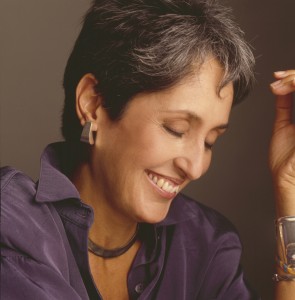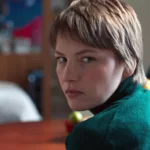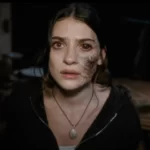“I know that I can’t sing forever. I know I’ve only got so many years left and then, you know, hopefully I’ll know when it’s my time to step off the stage,” says 72-year-old folk legend Joan Baez with a rueful laugh.
More than five decades since she cast her spell over crowds at the 1959 Newport Folk Festival, stepping onstage as an unknown and silencing those present with the crystalline clarity and forthright passion of her voice, Baez remains a musician who is much an activist as she is a performer.
Her list of accomplishments as an activist is long and varied, but among it are some of history’s most important moments – when she walked along the streets of the American south, fighting for civil rights alongside Dr. Martin Luther King Jr., and when she sang at the historic 1963 March on Washington.
To this day, Baez remains proudly and indelibly linked with the very things about which she was passionate then – music and social justice – but she has also added another string to her already accomplished bow: that of visual artist.
Though Baez still tours, these days she spends most days in her home studio, mixing paints and experimenting on canvases. She’s a realist when it comes to the future, saying that she’ll happily give up singing when her voice can no longer bear the strain.
She does what she can to take care of it and still loves performing. But, she reckons, when singing is no longer a possibility, she’ll happily devote herself to painting, something she sees as both another step on her artistic life journey and yet another method of self-expression.
“I started with collages and I spent some time with a local artist, just to sort of get my bearings, get my feet wet. At the moment I am mostly working on portraits. I’ve kind of restricted myself to touring for about two months a year,” she reveals.
“I’m transitioning from music to painting and I’m fine with that. It’s been 53 years or something since I started singing, so it makes sense that my voice is starting to wind down on me, you know? Like I said before, I know I can’t sing forever and I’m okay with that.”
Baez’s Australian tour this month will not only denote a significant chunk of her live performance schedule for 2013 but also mark her first shows here in more than 25 years.
Reminded that of that, she laughs again admitting that, “Australia, oh, it feels like a lifetime ago! I remember very little, but I remember I loved it.”
Alongside Joni Mitchell, Baez is justifiably regarded as one of the foremost folksingers of her generation and one of the all-time greats.
When people think of her, she says, they tend to oscillate between extremes, either remembering the very young Baez or – a soft chuckle, again – “the much older woman, shall we say, that I’ve become.”
“It’s funny, the way people remember me. I’ve worn my hair short for years now and it has, of course, gone grey, so they tend either to think of me as I am now, or as I was then, which was a very young woman, with long dark hair, and either way, I seem to always be holding my guitar,” she recalls.
Ask Baez about her career and she has to be drawn out of her shell, gently nudged to sing her own praises. In conversation, she’s warm and engaging, given to frequent laughter. All told, speaking with her feels more like chatting with an old friend than conducting an interview.
When Baez describes the 18-year-old who dropped out of university after only six weeks to perform folk music in local coffeehouses and clubs, she’s matter-of-fact about what she calls “my accidental career.”
“I had no idea what it would turn into. I loved music, but I was only 18 and you can’t plan for anything at that age, not really. I just sort of fell into it because I had this voice and I started performing, with no expectations at all of it becoming anything,” she remembers.
“It probably wasn’t the best model to follow for anybody else. I was at Boston University barely six weeks before I dropped out and had no idea the Newport performance would generate all of the interest and attention that it did.”
Baez’s earliest recordings for the legendary Vanguard Records not only established her as an artist of note, but also introduced into the broader musical vernacular of the 1960s both traditional, pastoral folk ballads and, as unbelievable as it seems now, the nascent works of an unknown contemporary named Bob Dylan.
In the first volume of his memoirs, 2004’s Chronicles: Volume One, Dylan writes reverently of Baez, referring to her as “far off and unattainable – Cleopatra living in an Italian palace. When she sang she made your teeth drop. I’d be scared to meet her.”
He later goes on to describe her as “the Queen of the Folksingers – she looked like a religious icon, she was so committed to social change, she was somebody you’d sacrifice yourself for and she sang in a voice straight from God.”
Though Baez is understandably these days both weary and wary of discussing their relationships, professional and romantic, she gives me a free pass early on in our conversation: “You know what? I haven’t spoken with Australia for so long that you can just ask what you want! So, sure, ask about Bob.”
And so, no longer afraid of seeming like some hack raking over the coals of a long-dead romance, I do ask about Bob and she’s fine with being asked.
“The main thing is, really, that I feel lucky that I was able to fuse the music and the activism in my career and to introduce non-violence into many places where there really was incredible resistance. The luck part of the equation is just as simple as being born at a certain time. I came of age in a 10-year period that was so full of monumental musical and social change, you know?” Baez notes.
“I really did come of age in a time that was marked by such change and revolution of the like that I just don’t think it will ever be repeated. Bob and I were the same age. We were interested in the same things. We believed in the same things and we were around at the same time. We were inevitable, I think. And you’re right – we were us, sure, but we were also part of something bigger.”
She pauses.
“I get asked if Bob and I still speak. That’s the inevitable question and I get that people are curious. So, to answer that, no, we do not. I do still perform his songs. Those songs will never age, never lose their ability to stand up, you know?” Baez says.
“I think, even when I wasn’t aware of it, when I was much younger, I knew that what he and I had was separate from the songs. They’re wonderful songs, but every single time I sing them, I do try and make them my own,” Baez says.
Given that Baez hasn’t toured Australia in so long and has a dauntingly long back catalogue of some 24 studio albums from which to draw material for live sets, I’m curious to know how she goes about compiling set lists.
“We do have a skeleton list that we work from. We narrow it down and if we get bored with one song, we switch it with something else. Or if there’s a new song that’s delightful, we’ll put that in. It keeps changing, but there is a basic structure – there has to be, otherwise I think it’d be a shambles, there’s so much that it’s impossible to just make decisions on the night and pull from such a huge pool of songs,” Baez says.
“It sounds corny, but the songs still do choose me. All of them, somewhere, have rung a bell inside of me. But the thing for, say, travelling to Australia, is that I don’t know what people know of me at the moment, so my job is to keep – and this is the key word – the set fresh. If I can keep the evening fresh, it doesn’t really matter what I sing.”
She laughs softly, again, before continuing.
“If it’s dull and it sounds like a nostalgia tour, I would be very, very unhappy. The audience might like it just okay, but I feel like my job is to do something more, to make it different, stretch it a little bit more. Of course I’ll do some of the songs that are most associated with me, some old, some newer, but I would hope that I’ll send the audiences home happy and that I’ll walk offstage feeling that I’ve given the best show I can give.”
Joan Baez plays at the Concert Hall, QPAC on August 12 and 26. Tickets from http://www.qtix.com.au/




